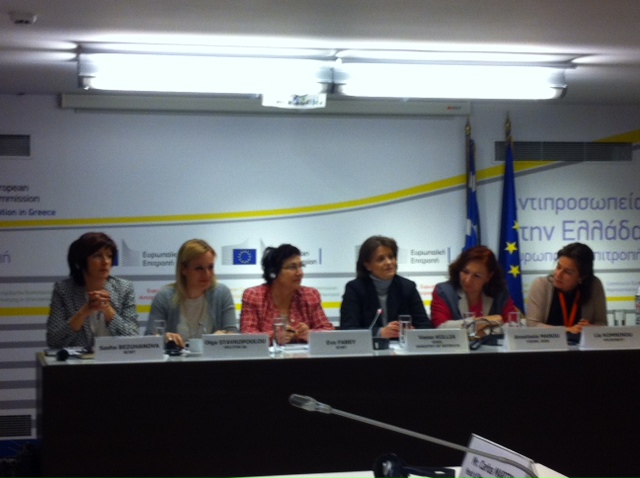Anastasia Balezdrova
High technologies have long entered the everyday life of modern man. We are constantly following with keen interest every innovation and improvement in various devices that are an integral part of our professional obligations or of our time for rest and entertainment. However, while both men and women are consumers of such products, the production process is still a male "priority".
At the same time, Europe lacks 700,000 professionals in the field of software and digital technologies to enable the European industry to meet its immediate requirements. The European Commission has warned of this and various initiatives have started at the European level. One of them puts the focus on mobilizing more women to qualify and work in the field of high technologies.
With that end in view, a conference on Women & Girls Go Digital will take place in Athens on Friday to present the initiative of the Greek Secretariat for Gender Equality and the European Centre for Women in Technology ECWT that aims to promote the employment of women in the IT sector.
During the preliminary press conference, general secretary Vasso Kolia explained that 21 organizations from the public and private sector, companies, research institutes and individuals had applied for participation in the Digital Alliance for Female Employment. She stated that the purpose of the initiative is directed mostly towards women, not excluding the possibility of it transferring to the entire labour force, especially in view of the record unemployment rate of 28% in Greece and the even more shocking youth unemployment rate of 61%.
The press conference was also attended by the chairwoman of the board of the European Centre for Women in Technology ECWT and creator of the Bulgarian centre, which is a national contact point of the European network, Sasha Bezuhanova. In her speech and in a statement for GRReporter the winner of the Digital Woman 2013 award indicated that female employment in the IT sector is very low and explained the reasons for this.

"The statistics are pretty daunting from two perspectives. First, if today's trend continues, namely, that many women stay at home and take care of their families after completing their education, within only 10-12 years, Europe will need 23 million skilled workers. However, if only 50% of women who complete their education proceed to have a career and work, this difference will be 3 million people and it will be covered by other tools.
The IT sector is male dominant not in Bulgaria alone, not in Europe alone, but globally. Moreover, there are prejudices that start from the family and school environments and they need to be removed to achieve a natural balance. Girls and women are just as talented, innovative and able to participate in the production of this digital process as men are. Simply the labels that society puts on one profession or another prevent people from following their talent. In fact, this discrimination exists in the opposite aspect, in terms of men, in other professions."
According to Sasha Bezuhanova, "Currently only 19% of start up-companies in Europe are run by women, 9 of every 100 applications at the European level are developed by women, 19% of managerial positions in IT companies are occupied by women and only 29 out of every 1,000 graduates in the field of technology are women, and the trend is for engineering professions to remain unpopular among women. This creates additional difficulties to meet the needs of the industry."
The response to this situation is to organize various activities allowing girls to have access to technologies from a fairly early age and begin to perceive them as a career.
"In Bulgaria we organize Girl's day: for one day we open for the youngest, the 10-year-olds, the virtual engineering laboratories where there are 3D and computer animations and films as well as the laboratory of robotics. Graduate students who work there become mentors of the children who learn, in an interesting way, how to make technology and are involved in this process. There are no barriers at this age and the children leave bright-eyed and enthusiastic," added Sasha Bezuhanova.
Chairwoman of the European Centre for Women in Technology Eva Fabry stressed in turn the need to create mentoring systems, networks and to exchange good examples and practices.